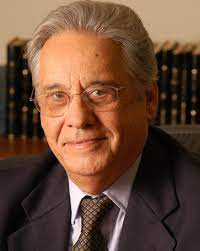Cardoso, Fernando

Bio: (1931-) Brazilian sociologist. Fernando Cardozo studied and received his doctorate from the University of Sao Paulo, where he later taught sociology. He was the president of the International Sociological Association in the period from 1982 to 1986. After the fall of the military dictatorship in Brazil, he became an active member of the Social Democratic Party, so in the period from 1992 to 1994 he was a minister in the Government of Brazil, and in the period from 1995 to 2002, he was also the President of Brazil.
Cardoso also had a very fruitful scientific career. In the beginning, he studied the topic of slavery in the southern part of Brazil, from a Marxist point of view. In the 1970s, Cardoso became one of the most famous proponents of the dependency theory. Unlike other proponents of the dependence theory and unequal exchange theory - Prebisch, Baran, Andre Gunder Frank - who believed that the economic position of underdeveloped countries depends solely on their position in relation to developed countries, Cardoso believed that both internal and external factors are important for the economic success of underdeveloped countries.
External factors - unequal exchange with developed countries, competition in the global market, and position in the international division of labor, affect the economic development of underdeveloped countries, but internal factors are more important. Class relations and conflicts, political alliances and the role of the state, historical circumstances, as well as the economic power of the bourgeoisie, are internal factors that affect the ability of each underdeveloped state to achieve economic progress. Cardoso believed that the external economic and political dependence of underdeveloped countries is not a limiting factor for economic development. This means that underdeveloped countries can participate in the global economy and at the same time achieve economic development and improve the position of their citizens. Whether that will happen depends, to a large extent, on the political and economic elites of each country. Those elites have a great number of pathways to choose from, which would, in turn, determine the path of the development of the whole country.
Fields of research
Authority Capitalism Capitalist Class Classes Conflict Democracy Dictatorship Economy Elites Industry Market Politics Slavery State WorkTheoretical approaches
Dependency TheoryMain works
Dependência e Desenvolvimento na América Latina (1970);
Politica edesenvolvimento em sociedades dependentes (1971);
Empresário Industrial e desenvolvimento económico no Brasil (1972);
O modelo politico brasileiro: e outros ensaios (1973);
Autoritarismo e democratização (1975);
As idéias e seu lugar: ensaios sobre as teorias do desenvolvimento (1980);
The New Global Economy in the Information Age (1993);
Charting a New Course: The Politics of Globalization and Social Transformation (2001).
Works translated into English:
Dependency and Development in Latin America (1979, in Portuguese 1970).

